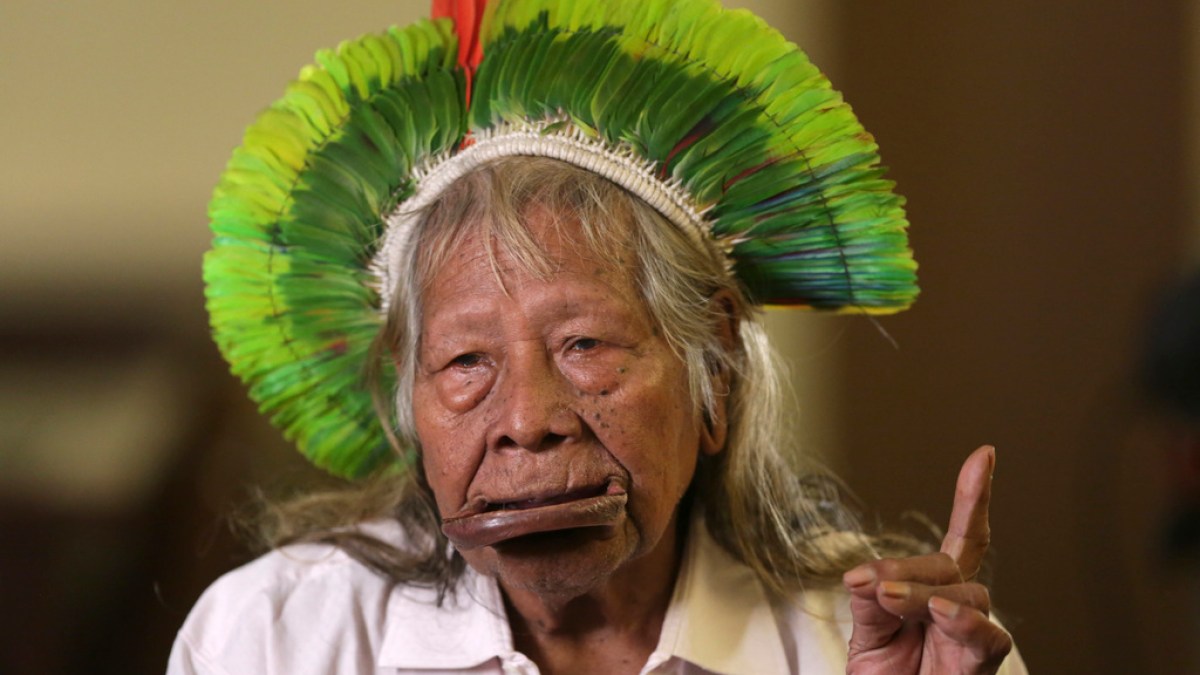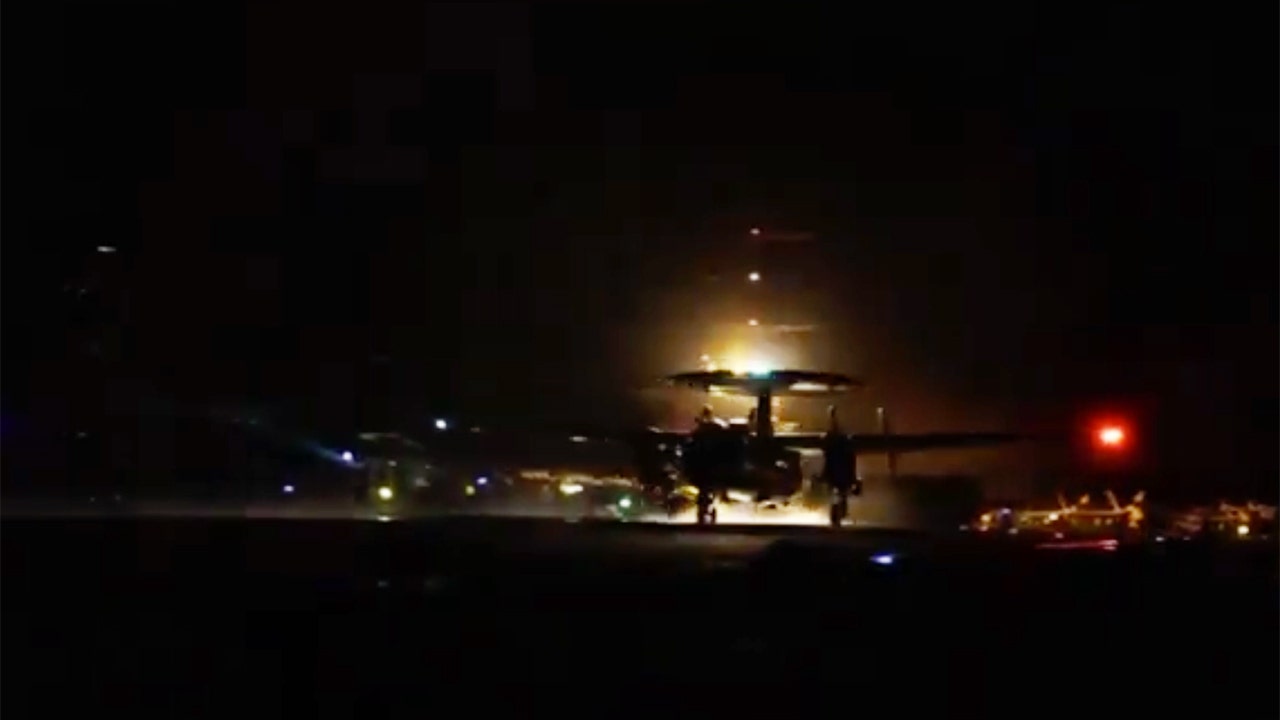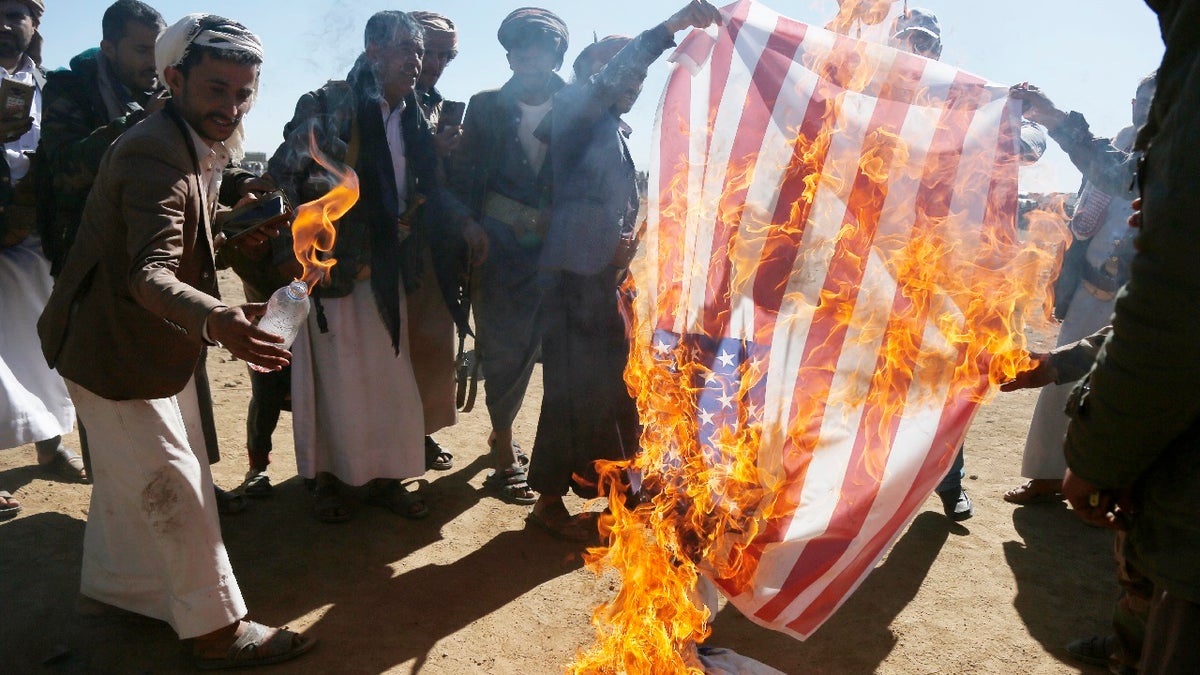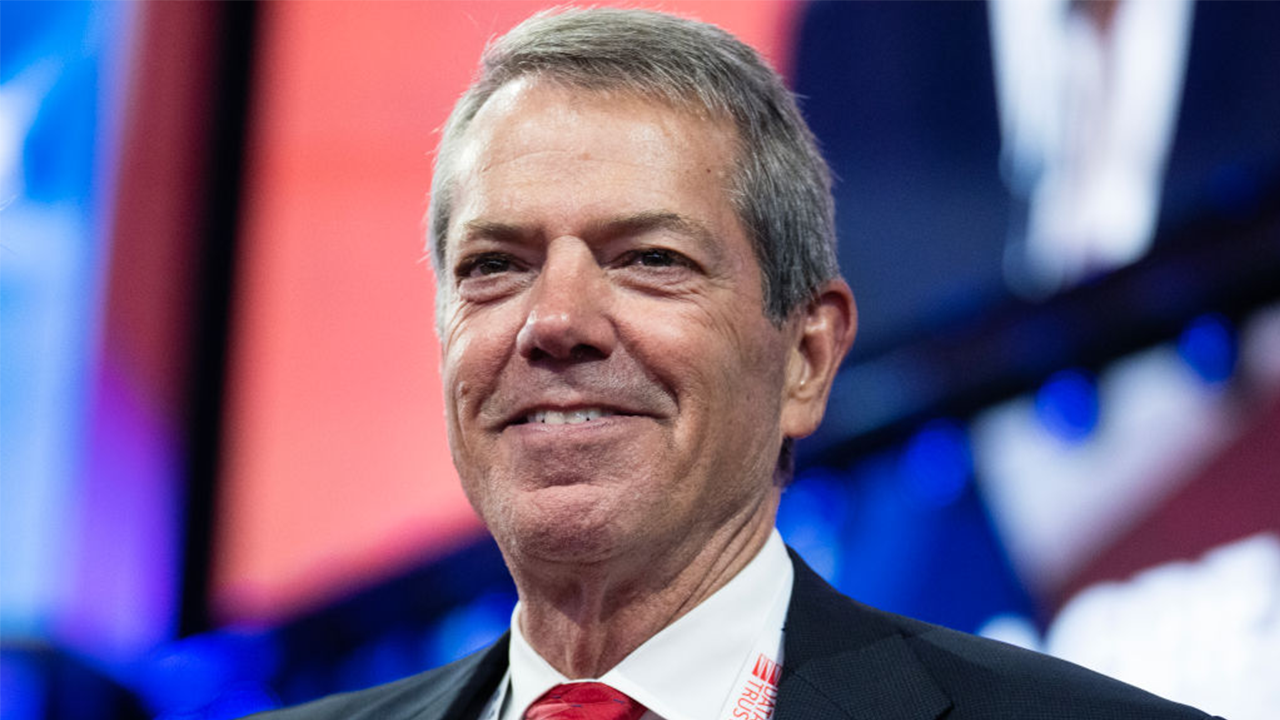World
Brazilian Indigenous chief demands greater role in climate debate

Chief Raoni Metuktire, a well-known leader from the Amazon, calls for removal of ‘invaders’ from Indigenous territory.
The Amazon’s most famous Indigenous leader has called upon Brazil’s president to defend the rights of Indigenous people.
Chief Raoni Metuktire demanded on Friday that “invaders” be removed from Indigenous territories and that the government stop negotiations on carbon credits that had excluded Indigenous people from the discussions.
In a letter to President Luiz Inacio Lula da Silva, Raoni called for the government to respond to 11 specific requests by August 9, the second and final day of the Amazon summit in Belem that Lula and other South American heads of state will attend.
The manifest was handed over to the minister of the Indigenous peoples, Sonia Guajajara, at an event attended by 1,000 members of different ethnic groups in the town of Sao Jose do Xingu in the state of Mato Grosso.
In May, Lula signed legislation paving the way for a market to trade carbon credits – generated by reducing greenhouse gas emissions that cause climate change and which may be purchased to comply with eventual limits on emissions.
Lula’s administration is reportedly drafting regulations for the carbon market’s operation and plans to present them in the coming months.
But Raoni said in his letter that Indigenous people have not been included in the process and that their participation is required to draft legislation that takes their rights into consideration.
Raoni, now in his 90s, also demanded the government take a “concrete position” on an upcoming court ruling that threatens to strip some Indigenous territories of their designations. The Supreme Court is in the process of evaluating whether Indigenous peoples must have been physically occupying their territories before 1988 in order to uphold their land claims.
For years, Raoni has campaigned for the protection of Indigenous territories in the Amazon. A 1978 documentary, Raoni: The Fight for the Amazon, contributed to his fame, as did a 1989 tour with British musician Sting.
The letter also demanded a halt to mining activities that have triggered a health crisis among the Yanomami people during the previous government of far-right President Jair Bolsonaro as illegal gold miners swarmed into their territory.
Lula’s government has spent months expelling most of them from Yanomami lands. Some remain, however, working at night to avoid being caught, Rodrigo Agostinho, the head of the environmental agency Ibama, said earlier this month.
Raoni’s letter also demanded mass testing of Indigenous people for exposure to mercury – widely used by gold prospectors to separate the metal – and medical treatment for those affected.
It also condemned so-called “agricultural partnerships” set up under Bolsonaro that forced Indigenous people to work in farming, saying they are “unconstitutional and go against the model of cultural sustainability”.
Friday’s event in Sao Jose do Xingu also showcased a letter from Britain’s King Charles expressing support for Raoni and noting a common desire to see the Amazon protected.
As a way of safeguarding their land, Brazil’s Indigenous people have pushed for the establishment of more Indigenous territories, a slow process that can take years.
Brazil has so far established 732 Indigenous territories, occupying more than 117 million hectares (453,000 square miles) – or nearly 14 percent of the country’s vast expanse, according to data from the Instituto Socioambiental.
Of 14 territories that the government said would be created, only six have been established so far under Lula’s latest term in office which started in January.
However, deforestation in the Amazon rainforest has dropped 33.6 percent in his first six months, compared with the same period in 2022, an encouraging sign for his administration’s environmental efforts.
Lula campaigned last year with pledges to rein in illegal logging and undo the environmental devastation under Bolsonaro. Raoni walked alongside Lula up the presidential palace’s ramp before his inaugural address on January 1.

World
US military conducts successful airstrikes on Houthi rebel forces in Yemen

The U.S. military confirmed it conducted airstrikes in Yemen, saying it targeted a missile storage site and a command-and-control center operated by Iran-backed Houthi rebels.
U.S. Central Command (CENTCOM) announced the successful strikes in a release Saturday, saying they were meant to “disrupt and degrade” Houthi operations.
“CENTCOM forces conducted the deliberate strikes to disrupt and degrade Houthi operations, such as attacks against U.S. Navy warships and merchant vessels in the Southern Red Sea, Bab al-Mandeb and Gulf of Aden,” CENTCOM said in a news release.
DISAPPROVAL MOUNTS BOTH AT HOME AND ABROAD AS US AVOIDS DIRECT ACTION AGAINST HOUTHI REBELS
The U.S. military successfully conducted airstrikes in Yemen, saying it targeted a missile storage site and a command-and-control site operated by Iran-backed Houthi rebels. (CENTCOM via X)
Footage from CENTCOM showed F/A-18’s taking off. The agency said it also used assets from the Navy and the Air Force.
US NAVY SHIPS REPEL ATTACK FROM HOUTHIS IN GULF OF ADEN
“The strike reflects CENTCOM’s ongoing commitment to protect U.S. and coalition personnel, regional partners and international shipping,” it said.

Houthi followers burn the Israeli and American flags on the outskirts of Sana’a, Yemen. (Mohammed Hamoud/Getty Images)
The attacks against shipping are ongoing, and Houthi militants have vowed to continue until Israel ends its campaign in Gaza.
The terrorist group has targeted more than 100 merchant vessels since the start of the Israel-Hamas war in October 2023.
World
Fact check: How deadly was 2024 for journalists?

An estimated 104 journalists lost their lives in 2024, with Palestine the most dangerous territory.
An estimated 104 journalists were killed worldwide over the past year, according to data shared earlier this month by the International Federation of Journalists (IFJ).
Another report by NGO Reporters Without Borders (RSF) puts the figure at 54, but its methodology means it only includes killings that are considered “directly related” to journalists’ professional activity.
Both organisations say that Palestine is the deadliest place on earth for journalists. More than half (55) of the 104 killings reported by IFJ were Palestinian media professionals in Gaza, while a further six were killed in Lebanon.
At least 138 journalists have been killed in Gaza since the war between Israel and Hamas broke out on 7 October 2023, making the country one of the “most dangerous in the history of modern journalism, behind Iraq, the Philippines and Mexico,” according to the IFJ.
Reporters without Borders has described the number of killings in Gaza as “an unprecedented bloodbath”.
Israel firmly denies it has intentionally targeted any journalists, but has recognised some that have been killed in its airstrikes on Gaza.
The 104 total killings reported by the IFJ is a slight decrease on the 129 they reported on in 2023, which is considered the bloodiest year for journalists since 1990.
How do other world regions fare?
Asia Pacific is the world’s second most dangerous region for journalists, after the Middle East, according to the IFJ.
It recorded 20 deaths in the region in 2024, of which 70% happened in the southern Asian countries of Pakistan, Bangladesh and India.
The region has seen an “upsurge” in violence, according to the IFJ, with deaths increasing sharply from the 12 recorded in 2023.
Africa was the third most dangerous region for journalists at eight deaths, five of them in war-torn Sudan.
The number of journalists killed in south, central and north America has dropped sharply over the past two years, from 30 in 2022 to six in 2023, and another six in 2024. Mexico, considered to be one of the deadliest places in the world to do journalism, continues to see “threats, intimidation, kidnappings and murders” against journalists, particularly due to reporting on drug trafficking.
Number of journalists behind bars on the rise
According to IFJ estimates on 10 December, there were 520 journalists in prison across the world, considerably more than in 2023 (427) and 2022 (375).
China, including Hong Kong, accounts for most of journalists behind bars, followed by Israel and Myanmar.
The IFJ says the figures show how “fragile” the independent press is and how “risky and dangerous” the profession of journalism has become.
World
Italian state railways plans 1.3 bln euro investment in solar plant

-

 Politics1 week ago
Politics1 week agoCanadian premier threatens to cut off energy imports to US if Trump imposes tariff on country
-
/cdn.vox-cdn.com/uploads/chorus_asset/file/25789444/1258459915.jpg)
/cdn.vox-cdn.com/uploads/chorus_asset/file/25789444/1258459915.jpg) Technology1 week ago
Technology1 week agoOpenAI cofounder Ilya Sutskever says the way AI is built is about to change
-

 Politics1 week ago
Politics1 week agoU.S. Supreme Court will decide if oil industry may sue to block California's zero-emissions goal
-
/cdn.vox-cdn.com/uploads/chorus_asset/file/25546252/STK169_Mark_Zuckerburg_CVIRGINIA_D.jpg)
/cdn.vox-cdn.com/uploads/chorus_asset/file/25546252/STK169_Mark_Zuckerburg_CVIRGINIA_D.jpg) Technology1 week ago
Technology1 week agoMeta asks the US government to block OpenAI’s switch to a for-profit
-

 Business1 week ago
Business1 week agoFreddie Freeman's World Series walk-off grand slam baseball sells at auction for $1.56 million
-
/cdn.vox-cdn.com/uploads/chorus_asset/file/23951353/STK043_VRG_Illo_N_Barclay_3_Meta.jpg)
/cdn.vox-cdn.com/uploads/chorus_asset/file/23951353/STK043_VRG_Illo_N_Barclay_3_Meta.jpg) Technology1 week ago
Technology1 week agoMeta’s Instagram boss: who posted something matters more in the AI age
-
News1 week ago
East’s wintry mix could make travel dicey. And yes, that was a tornado in Calif.
-
/cdn.vox-cdn.com/uploads/chorus_asset/file/24924653/236780_Google_AntiTrust_Trial_Custom_Art_CVirginia__0003_1.png)
/cdn.vox-cdn.com/uploads/chorus_asset/file/24924653/236780_Google_AntiTrust_Trial_Custom_Art_CVirginia__0003_1.png) Technology2 days ago
Technology2 days agoGoogle’s counteroffer to the government trying to break it up is unbundling Android apps




/cdn.vox-cdn.com/uploads/chorus_asset/file/25535557/STK160_X_TWITTER__D.jpg)










